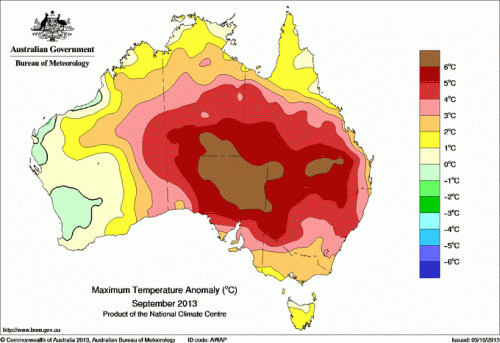
2013 is well on its way to becoming the warmest calendar year on record in Australia. The country has just set a new record for the warmest spring ever.
Mean temperatures for Australia’s spring (which occurs during the U.S.’s fall) were 1.57°C above the 1961-1990 average. September was especially hot, with an average temperature of 2.75°C or nearly 5°F above normal. October came in at 1.43°C above average, while November came closer to normal, at 0.52C above average. And in addition to being unusually warm, spring also came early. On August 31, the last day of winter, average temperatures reached 85.9°F. It was the warmest last day of winter recorded since Australia started collecting temperature data 104 years ago.
To date, the year is 1.23°C above average and 0.18°C above the previous record year, 2005.
Australia’s record-breaking spring follows a generally wet winter and a summer that was also the country’s hottest on record. Temperatures soared so high in January that the Australian Bureau of Meteorology added new colors to its temperature maps. Deep purple now represents temperatures in excess of 50°C, or 122°F. The new high end of the scale tops out at 129 °F.
Thanks to the wet winter that helped vegetation flourish, followed by a hot spring that sucked out all the moisture, the east and west coasts of Australia may have to contend with another above-normal bushfire season this summer. Bushfire season in Australia has already gotten off to an early start as four major fires ravaged western Sydney and the surrounding Blue Mountains area of New South Wales in September.
The newest record broken in Australia comes just as the Australian Senate is debating the repeal of its carbon tax. Australia’s newly elected Prime Minister, Tony Abbott, who ran on an anti-climate agenda, has been making good on his campaign promises, much to the dismay of the climate conscious at home and abroad. He is hard at work dismantling the country’s carbon emissions scheme, and publicly shunned the recent UN climate talks in Warsaw by declining to send a senior elected member of his government. Abbott has also confirmed that his government has no intentions of reducing Australia’s emissions by more than five percent below 2000 levels by 2020 and has cut funding for the Australian Renewable Energy Agency (ARENA). Funding for ARENA over the next two years will be about one fifth of current levels.
Source: Climate Progress. Reproduced with permission.










